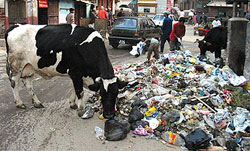 When the streets of Kathmandu became cleaner and garbage heaps disappeared after February First, people said; "Wow, things are working." A year later the streets are back to the way they were, garbage is a familiar sight. Walk around the streets of New Road on a Saturday afternoon and you will find that vendors have taken over sidewalks, makeshift stalls selling momos and other finger food. Traffic discipline is non-existent. In India in 1975 when Indira Gandhi declared an emergency, the trains ran on time for a while and people celebrated. However, things went back to normal pretty soon. Same here.
When the streets of Kathmandu became cleaner and garbage heaps disappeared after February First, people said; "Wow, things are working." A year later the streets are back to the way they were, garbage is a familiar sight. Walk around the streets of New Road on a Saturday afternoon and you will find that vendors have taken over sidewalks, makeshift stalls selling momos and other finger food. Traffic discipline is non-existent. In India in 1975 when Indira Gandhi declared an emergency, the trains ran on time for a while and people celebrated. However, things went back to normal pretty soon. Same here.
Most economists would agree that autocracies can make reform difficult, especially in this era of pressure for free market changes. When parliamentary democracy is suspended, the mood turns anti-establishment and everyone blames the government for everything that goes wrong. Similarly when vibrant opposition exits, self-regulation emerges. Governments in Japan, India, Philippines and Indonesia have changed on many pertinent economic issues.
Democracy ensures that the Laludom can't go on and on. A system without accountability breeds shady backroom power brokers who can provide or deny, favours at will. Someone must be providing protection for the proliferating stalls around Dharmapath-just as someone must be steering the much, much bigger usurpation by cronies of state-owned utilities.
In the current system where many business people are holding important offices, it becomes even more important that such regulation is taken seriously. How can office holders ensure that they draw a line between the business they conduct as individuals and their new responsibilities as officials? How to be sure that they are not profiting from the knowledge they have about laws to be amended or policies the government is planning? How not to be swayed by personal interests and stall important regulatory bills? How to implement new policies without bias?
Business people by and large are politically conservative. Democracies are just too messy and one has to keep too many sets of people happy. But in the current system one just needs to be cosy with a few political masters and some of them may even belong to one's fraternity.
One issue haunting the current administration is that despite the end of corrupt democracy, things are still as corrupt as before. In the absence of an opposition watchdog, errors and omissions in anti-corruption campaigns are overlooked. Unfortunately, with the absence of parliament, state finances do not become an issue of public debate. Similarly, the role of the Auditor General's office becomes fuzzy as its employees are uncertain if their objective should be to act as strong auditing or to keep their jobs.
Domestic and foreign investors are encouraged by strong regulation, the absence of conflicts of interest and a government focused on economic growth. In 2006 we will see how highly placed individuals balance their political ambitions with the country's economic needs.



